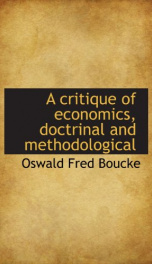a critique of economics doctrinal and methodological

Purchase of this book includes free trial access to www.million-books.com where you can read more than a million books for free. This is an OCR edition with typos. Excerpt from book: CHAPTER FOUR DISTRIBUTION Preliminary Definitions.If economists had treated incomes consistently as prices, without bothering about forces other than the psychological in their attempts at explaining these incomes, a critical review of the price analysis would suffice for the distributive aspects also. It is however wellknown that few writers were content with a discussion of income laws entirely from the standpoint of demand and supply. What seemed to impress all of them was the necessity of bringing in non-psychic elements in order to find laws for shares comparable to those of commodity prices. Even Marginism, which labored most conscientiously to make of economics an exact science by relying upon the hedonistic calculus in all its arguments, could not avoid at certain moments to admit objective norms. Distribution therefore is not altogether a special case of pricing for goods. There are facts to be considered which a rejection of the sensa- tionalistic theory of valuation does not touch, and relative to which one is prone to ask more than ever: Were laws of distribution really found, or was the qualitative analysis, in spite of special aids, again a half-way procedure? Certainly, if one is to believe the literature on the subject, some very creditable results were obtained. Both Utilitarian and Marginal economists delimited thescope of Distribution as a special division along two main lines. The first was the exclusion of data not within the competitive exchange mechanism; and the second, the assumption of specified legal conditions thanks to which all producers could be assigned to one of four classes. The first of the two principles was the most important because of the definition of "economic" that it involved; but the second was emphasized more regularly, for it l...
Users who have this book
Users who want this book
What readers are saying
What do you think? Write your own comment on this book!
write a commentif you like a critique of economics doctrinal and methodological try:
Other books by this author
Do you want to exchange books? It’s EASY!
Get registered and find other users who want to give their favourite books to good hands!

